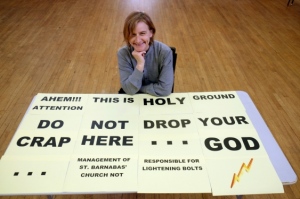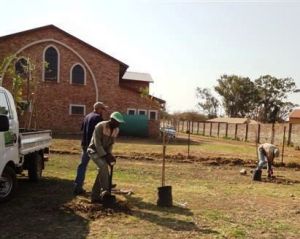From
AnglicanTaonga.org.nz via
Anglican Communion News Service
Revd Mathew Newton of St Paul’s is asking the Auckland Diocesan Synod this week to divest funds from companies whose main business is the extraction or production of fossil fuels.
In an interview with TV3’s Firstline programme, Mathew said, “For us, the science is really clear; we need to keep 80 per cent of the world’s gas, oil and coal reserves within the ground if we are going to have any chance of keeping the rise in climate to within 2ºC.
“So divesting from fossil fuels is very much a pertinent issue of the age, and we need to start acting now.”
The divestment motion to synod follows similar steps by churches in other countries, including the USA , the UK and Australia , and it responds to a call to divest issued by Archbishop Desmond Tutu last April.
“Climate change is a deeply moral issue,” Archbishop Tutu said. “Here in Africa we see the dreadful suffering of people from worsening drought, from rising food prices, from floods, even though they’ve done nothing to cause the situation. [By divesting] once again we can join together as a world and put pressure where it counts.”
If the Auckland motion receives the support of synod this week, the diocese will be the first church body in New Zealand to join the global divestment movement. But it may not be the last.
Fossil fuel divestment is on the agenda for other diocesan synods in September and October, and discussions on the topic are taking place among Catholic, Presbyterian and Baptist leaders.
Topic of grave concern
For several years senior church leaders in New Zealand have been expressing grave concern about climate change. In 2006 the Anglican bishops issued a joint statement acknowledging global warming to be “a real and present danger to the future of this planet and the survival of the species.”
Later that year the Catholic bishops noted warnings from climate scientists and called for serious efforts to limit global warming and to curb its potential impact on the global poor.
“The decisions of this generation over the next 20 years,” the bishops said, “will impact on the future of humanity.”
Ahead of the Copenhagen climate summit in 2009, the heads of the Methodist, Presbyterian, Baptist, Anglican and Catholic Churches and the Salvation Army penned a statement calling for “bold action” by the New Zealand government and all world leaders.
“Scientists warn us that the window of opportunity for change is now very narrow,” the church leaders noted. “They warn us that if we do not grasp this opportunity, future generations will be the ones to bear the cost.”
Climate change is seen as a moral issue by these church leaders, and the reasons are not far to find. Recent reports by the World Bank highlight how climate change will disproportionately affect the poor and vulnerable – not least in the Pacific islands where sea level rise poses an existential threat.
A recent high-profile review in the The Lancet medical journal described climate change as “the biggest global health threat of the 21st century.”
“The scientific view of the severity and extent of the threat posed by climate change may not be well understood by the majority of churchgoers in New Zealand,” says Mathew Newton.
“But it is well understood by senior church leaders, and they take the issue very seriously. Among their ranks there is no longer any debate over the science. The challenge is simply to know what can be done about it.”
The divestment breakthrough
The global divestment movement appears to be opening up a new path of action on climate change.
The divestment strategy relies on fact that businesses require investment. And since investors can freely choose where to invest their money, divestment is a path of action that bypasses the stalled pathways of government policy and international agreements.
Mathew Newton sees good reasons for social responsible investors, including churches, to screen out fossil fuel stocks from their portfolios,“We have grown up accepting fossil fuels as a normal and benign component of everyday life. But when you take account of just how harmful fossil fuels are turning out to be for the planet and all living creatures on it, it is hard to avoid the conclusion that we shouldn’t be financing this industry any longer.
“Of course, fossil fuels have brought and continue to bring many benefits to society. But as the marginal cost of opting for clean alternatives over fossil fuels comes down, it seems more and more unconscionable to impose on the planet the high environmental cost of persisting with fossil fuels.
“From this perspective, excluding fossil fuel companies from church investment portfolios is simply a logical expression of existing commitments to ethical and socially responsible investing.”
Business journalist Rod Oram, who addressed a gathering of Auckland Anglicans at a forum on fossil fuel divestment last weekend, said fossil fuel divestment “is probably the most inspired and practical and powerful idea that anyone has yet come up with about trying to really knock back CO2 emissions.”
The good news, according to Rod, is that investing in fossil fuel companies hasn’t added value to share portfolios over recent years. At the same time, there are good reasons to think fossil fuel stocks will prove a risky investment over the coming years because of the so-called carbon bubble in the market.
“So, yes this is a moral issue, yes this is a science and climate issue. And I’m passionate about all that. “But the plain economics of this is what the most immoral, unscientific, unsocially just person in the world should be able to respond to as well.”
Churches leading from the front
Over the past decade, New Zealand churches have taken some steps to reduce their carbon footprint. Auckland Diocese has been a leader, thanks to the work of its Diocesan Climate Change Action Group and its appointment of a sustainability worker.
Nonetheless, parishes have not shown a great deal of enthusiasm for sustainability efforts.
Mathew Newton believes that with divestment it will be a different story.
“Taking money out of the fossil fuel industry is a bold move. It sends a strong signal about the urgency of tackling climate change and about the church’s commitment to standing with the poor and vulnerable who will be hit first and hardest by climate change.
“Not only that, divestment by churches has the potential to produce a cascade effect in society.”
Mathew said that faithful and resolute action by the church could be just what New Zealand needs to help it regain its focus on tackling climate change.
 New Westminster Anglican Rev. Emilie Smith is making the news these days for her activism in Canada — and Latin America.
New Westminster Anglican Rev. Emilie Smith is making the news these days for her activism in Canada — and Latin America.








